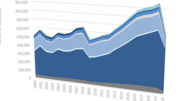Reports

Sharing the Costs, Sharing the Benefits: Inclusion is the Best Medicine
As policymakers debate the scope and form of the health care reform package now taking shape in Congress, it is important to understand the role of immigrant participation in the current health care system. Misconceptions about immigrants and their participation in our health care system abound, the facts demonstrate that immigrants can and should contribute to any new program. It is both good policy and common sense to treat access to health insurance for all as an investment in the nation’s public health. Categorical exclusions of any kind—whether of immigrants, redheads, or cat owners—are a mistake. It makes more sense to allow everyone to buy affordable health care. Read More

A Conversation about the Economic Effects of Immigration on African Americans
Anti-immigrant groups have repeatedly tried to drive a wedge between African Americans and immigrants by capitalizing on the myth that immigrants take American jobs. In a new Perspectives piece for the Immigration Policy Center, Yale Professor Gerald Jaynes dispels the myth that immigrants take “black jobs” and instead suggests we find solutions on how to lift up all low-wage American workers. Most African Americans are very conflicted about the immigration issue. African Americans, who have long espoused strong beliefs in principles of equality of opportunity, the rights of the downtrodden, and respect for humanity viewed in its broadest terms, are especially cognizant of the hypocrisy embedded within ethnocentric demands for an end to immigration. For the nation, immigration‘s economic benefits exceed its costs, but the costs are disproportionately borne by certain social groups and geographic areas. Rather than divide the public over the issue of depriving the country of the benefits to help the few who pay the highest costs, we need to be engaging in a political debate over the kinds and levels of compensatory policies that should be enacted to help low‐income citizens. Read More

The Facts About the Individual Taxpayer Identification Number (ITIN)
The Individual Taxpayer Identification Number (ITIN) is a tax-processing number issued by the Internal Revenue Service (IRS) to ensure that people—including undocumented immigrants—pay taxes. Read More

Keeping Migrants Here: Recent Research Shows Unintended Consequences of U.S. Border Enforcement
The Department of Homeland Security released a report this week showing that apprehensions of undocumented immigrants at the U.S.-Mexico border are at their lowest level since 1973, leaving many observers contemplating the factors responsible for this decline. Is it the recession-plagued U.S. economy or beefed-up enforcement efforts? New data from a research team led by Wayne Cornelius, Director of the Center for Comparative Immigration Studies at the University of California, San Diego, sheds light on the decline in apprehensions and reveals the surprising, unintended consequences of border enforcement. Read More

Fuzzy Math: The Anti-Immigration Arguments of NumbersUSA Don’t Add Up
According to the anti-immigration group NumbersUSA, immigration to the United States is all about arithmetic: immigration increases the U.S. population, and more people presumably means more pollution, more urban sprawl, more competition for jobs, and higher taxes for Americans who must shoulder the costs of “over-population.” At first glance, this argument is attractive in its simplicity: less immigration, fewer people, a better environment, more jobs, lower taxes. However, as with so many simple arguments about complex topics, it is fundamentally flawed and misses the point. “Over-population” is not the primary cause of the environmental or economic woes facing the United States, so arbitrary restrictions on immigration will not create a cleaner environment or a healthier economy. Read More

Untying the Knot Series: Unemployment and Immigration
Untying the Knot (Part I of III): The Unemployment and Immigration Disconnect With Congress once again poised to consider comprehensive immigration reform, a key question confronting lawmakers is to what extent immigration and unemployment are related. Opponents of immigration reform frequently argue that immigrants “take” jobs away from many native-born workers, especially during economic hard times. Yet an analysis of data from the U.S. Census Bureau clearly reveals that this is not the case. In fact, there is little apparent relationship between recent immigration and unemployment rates at the regional, state, or county level. Read More

Facts about Farmworkers
AgJOBS is a bipartisan, compromise bill that is the result of years of negotiations among farmworkers, growers, and Members of Congress. Get the facts on Farmworkers. Read More

Immigration Reform Cited as an Economic Necessity and a Net Gain
The Immigration Policy Center (IPC) has culled the words of leading economists and numerous experts who agree that immigration reform is an economic necessity and a net gain to the U.S. economy. Read More

What Immigration Reform Could Mean for the U.S. Economy
Now more than ever, Americans are seeking real solutions to our nation’s problems, and there is no better place to start than protecting our workers, raising wages, and getting our economy moving again. Part of this massive effort must include workable answers to our critically important immigration problems. Read More

Employment-Based Visa Categories in the United States
Current U.S. immigration law provides several paths for foreign workers to enter the United States for employment purposes on a temporary or permanent basis. This fact sheet provides basic information about how the employment-based U.S. immigration system works. Read More
Make a contribution
Make a direct impact on the lives of immigrants.
